 Pasadena, CA – More than halfway to the Red Planet, NASA’s Perseverance Mars rover isn’t just shuttling sophisticated science instruments and tubes to be filled with Earth-bound rock samples. It’s carrying symbols, mottos, and objects that range from practical to playful – everything from meteorite fragments to chips carrying the names of 10.9 million people.
Pasadena, CA – More than halfway to the Red Planet, NASA’s Perseverance Mars rover isn’t just shuttling sophisticated science instruments and tubes to be filled with Earth-bound rock samples. It’s carrying symbols, mottos, and objects that range from practical to playful – everything from meteorite fragments to chips carrying the names of 10.9 million people.
The “extras” are part of a tradition that harks back to the early space age and is now called “festooning” in NASA lingo.
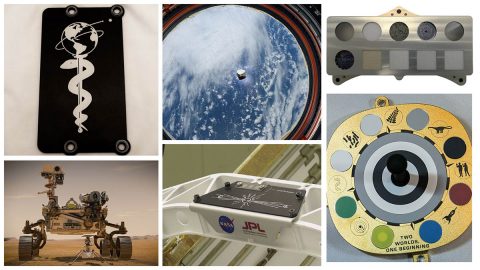
A plaque aboard Pioneer 10 and 11 displays a man and a woman for distant spacefarers who might find the spacecraft.
The Golden Record aboard Voyager 1 and 2 serves a similar purpose. Metal from the wreckage of the Twin Towers on 9/11 was installed on the rovers Opportunity and Spirit, while Spirit also carried a memorial to the crew of Space Shuttle Columbia.
“These kinds of embellishments add artistic elements on missions that are otherwise solely dominated by science and technology, as well as lasting tributes to colleagues who have helped pave the way for humanity’s exploration of space,” said Jim Bell of Arizona State University, who has helped festoon almost all of NASA’s Mars rovers, including Perseverance. Bell is the principal investigator of Perseverance’s Mastcam-Z, a pair of zoomable cameras that will capture gorgeous color panoramas of the Martian surface.
The 1909 penny aboard the Curiosity rover nods not just to the hundredth anniversary of the Lincoln penny, but also to how geologists often include a penny for scale when analyzing images of rock features.
In fact, the object serves a similar purpose on Curiosity: Scientists use it as a calibration target – a kind of default they can use to check the settings of the Mars Hand Lens Imager camera. Because cameras frequently take images of these targets, they’re the ideal places to add a motto or decorative symbols for viewing by the public.
As with Curiosity, Perseverance was built at NASA’s Jet Propulsion Laboratory in Southern California, which leads the mission. Much of the festooning aboard the rover serves a dual purpose. Here are some prime examples.
Mastcam-Z Made You Look
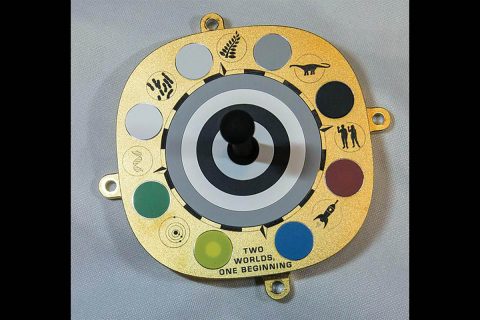
Serving as Perseverance’s main “eyes,” Mastcam-Z is the latest in a line of instruments that Bell has helped develop. The instrument’s primary calibration target, which doubles as a sundial for educational purposes, includes color and grayscale swatches. These help scientists ensure the cameras’ color settings are correct, given that the position of the Sun and the dustiness of the sky can affect the lighting in images.
Spirit and Opportunity carried similar sundials, which bore the motto “Two Worlds, One Sun,” while Curiosity’s sundial reads, “To Mars to Explore.” Mastcam-Z’s sundial motto is “Two Worlds, One Beginning,” referring to the idea of Earth and the Red Planet growing out of the same proto-stellar dust.
Besides the motto and swatches, the sundial displays small line drawings of early life forms on Earth, including cyanobacteria, a fern and a dinosaur. There’s also a man and woman similar to those on the Pioneer plaques and the Golden Record. It’s all in tribute to Perseverance’s astrobiology mission, searching for signs of ancient microbial life on the planet’s surface.
Just out of view, on the outer edge of the calibration target, there’s a bonus inscription: “Are we alone? We came here to look for signs of life, and to collect samples of Mars for study on Earth. To those who follow, we wish a safe journey and the joy of discovery.” Surrounding the message is the phrase “Joy of Discovery” in a variety of languages.
Finding SHERLOC
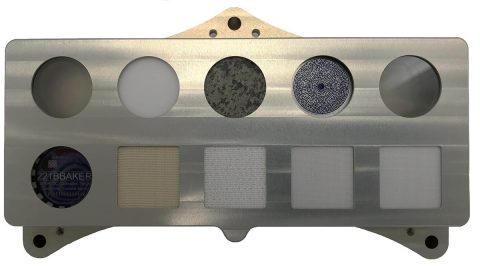
To the millions of people who geocache, using their smartphone GPS to hunt for objects hidden by fellow enthusiasts, satisfaction goes hand in hand with finding the most remote geocaches. Now there’s one geocache more remote than any other: a special coin aboard Perseverance.
Made of helmet-visor material and inscribed with the address of the instrument’s fictional detective namesake, it’s part of the calibration target for SHERLOC (Scanning Habitable Environments with Raman & Luminescence for Organics & Chemicals), an instrument on the end of Perseverance’s 7-foot-long (3-meter-long) robotic arm.
SHERLOC’s calibration target is packed with other goodies, too. In order to fine-tune the instrument’s settings, scientists added a slice of Martian meteorite. Along with the visor material, four other samples of spacesuit materials also reside on the target so that NASA can observe how they hold up on the irradiated, dusty Martian surface.
SuperCam’s Mars Meteorite
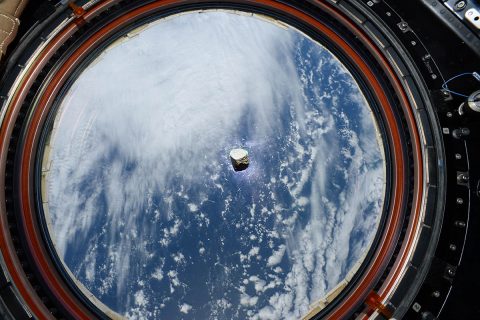
As rock collectors, geologists lean toward their favorite subject for festooning. That’s why the scientists who built SuperCam selected their own slice of Martian meteorite. SuperCam is a laser instrument that zaps rocks and “soil,” then measures the resulting vapor to determine their composition.
This particular piece of rock on SuperCam made a roundtrip voyage to the International Space Station before scientists added it to Perseverance.
The parts of SuperCam on Perseverance’s mast, or “head,” were provided by Centre National d’Etudes Spatiales, the French space agency, along with the meteorite.
Almost 11 Million Names
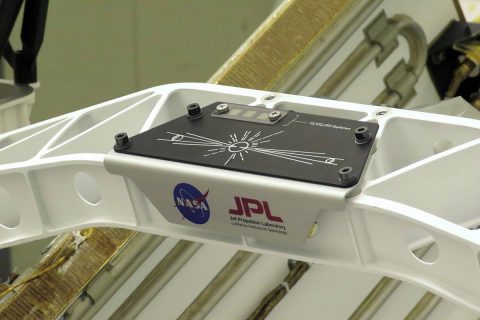
Since the days of Spirit and Opportunity, JPL has been providing people around the world a chance to “fly” to Mars by sending their names there. Microchips stenciled with names submitted by the public have been carried by all of NASA’s landed Mars missions going back to Pathfinder in 1997.
Curiosity, the last rover to touch down on Mars, carries a microchip with 1.2 million names. Perseverance beat that, carrying three small chips stenciled with 10.9 million names. Those chips even bear the 155 finalist essays submitted for Perseverance’s “Name the Rover” contest.
Visible to the cameras on the rover’s mast, the chips share space on a metal plate located at the center of Perseverance’s aft crossbeam and adorned with a laser-etched graphic depicting Earth and Mars joined by the star that gives light to both. The phrase “Explore as one,” written in Morse code in the Sun’s rays, connects the two.
But the simple illustration also connects this mission with the Pioneer and Voyager spacecraft and their festooning.
A COVID Memorial on Mars
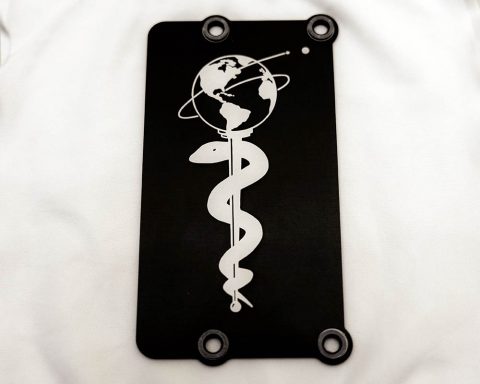
The year 2020 will be remembered for the novel coronavirus pandemic. Engineers managed to stay on course to complete building and testing Perseverance in clean rooms in California and Florida while observing pandemic-related safety precautions.
The rover team wanted to recognize the challenges faced by the global community and honor the many healthcare workers who have risked their lives to help those affected by the pandemic.
A special aluminum plate on the rover’s left side bears an image of planet Earth supported by the Rod of Asclepius, an ancient Greek symbol displaying a snake-entwined rod to symbolize healing and medicine.
About the NASA’s Mars Perseverance Rover Mission
A key objective for Perseverance’s mission on Mars is astrobiology, including the search for signs of ancient microbial life. The rover will characterize the planet’s geology and past climate, pave the way for human exploration of the Red Planet, and be the first mission to collect and cache Martian rock and regolith (broken rock and dust).
Subsequent missions, currently under consideration by NASA in cooperation with the European Space Agency, would send spacecraft to Mars to collect these cached samples from the surface and return them to Earth for in-depth analysis.
The Mars 2020 mission is part of a larger program that includes missions to the Moon as a way to prepare for human exploration of the Red Planet. Charged with returning astronauts to the Moon by 2024, NASA will establish a sustained human presence on and around the Moon by 2028 through NASA’s Artemis lunar exploration plans.
JPL, which is managed for NASA by Caltech in Pasadena, California, built and manages operations of the Perseverance rover.
For more about Perseverance:



